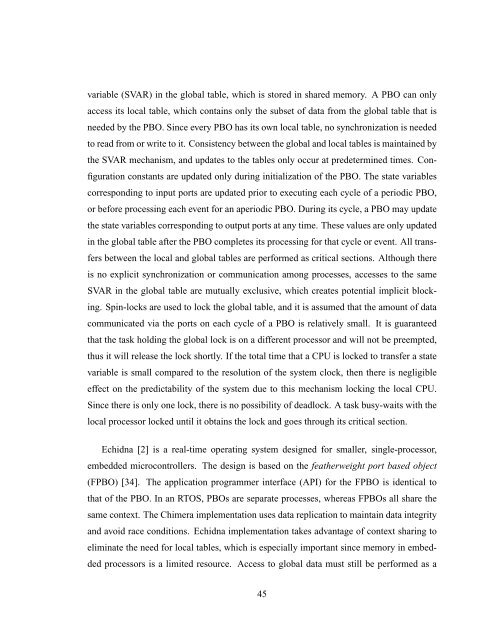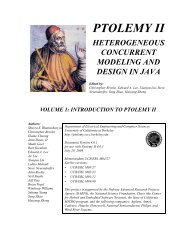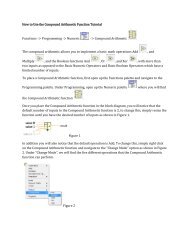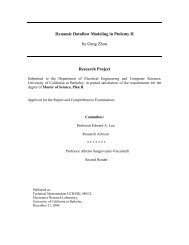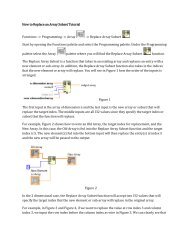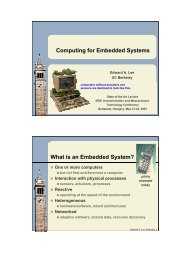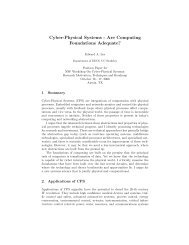Design and Implementation of TinyGALS: A Programming Model for ...
Design and Implementation of TinyGALS: A Programming Model for ...
Design and Implementation of TinyGALS: A Programming Model for ...
Create successful ePaper yourself
Turn your PDF publications into a flip-book with our unique Google optimized e-Paper software.
variable (SVAR) in the global table, which is stored in shared memory. A PBO can only<br />
access its local table, which contains only the subset <strong>of</strong> data from the global table that is<br />
needed by the PBO. Since every PBO has its own local table, no synchronization is needed<br />
to read from or write to it. Consistency between the global <strong>and</strong> local tables is maintained by<br />
the SVAR mechanism, <strong>and</strong> updates to the tables only occur at predetermined times. Con-<br />
figuration constants are updated only during initialization <strong>of</strong> the PBO. The state variables<br />
corresponding to input ports are updated prior to executing each cycle <strong>of</strong> a periodic PBO,<br />
or be<strong>for</strong>e processing each event <strong>for</strong> an aperiodic PBO. During its cycle, a PBO may update<br />
the state variables corresponding to output ports at any time. These values are only updated<br />
in the global table after the PBO completes its processing <strong>for</strong> that cycle or event. All trans-<br />
fers between the local <strong>and</strong> global tables are per<strong>for</strong>med as critical sections. Although there<br />
is no explicit synchronization or communication among processes, accesses to the same<br />
SVAR in the global table are mutually exclusive, which creates potential implicit block-<br />
ing. Spin-locks are used to lock the global table, <strong>and</strong> it is assumed that the amount <strong>of</strong> data<br />
communicated via the ports on each cycle <strong>of</strong> a PBO is relatively small. It is guaranteed<br />
that the task holding the global lock is on a different processor <strong>and</strong> will not be preempted,<br />
thus it will release the lock shortly. If the total time that a CPU is locked to transfer a state<br />
variable is small compared to the resolution <strong>of</strong> the system clock, then there is negligible<br />
effect on the predictability <strong>of</strong> the system due to this mechanism locking the local CPU.<br />
Since there is only one lock, there is no possibility <strong>of</strong> deadlock. A task busy-waits with the<br />
local processor locked until it obtains the lock <strong>and</strong> goes through its critical section.<br />
Echidna [2] is a real-time operating system designed <strong>for</strong> smaller, single-processor,<br />
embedded microcontrollers. The design is based on the featherweight port based object<br />
(FPBO) [34]. The application programmer interface (API) <strong>for</strong> the FPBO is identical to<br />
that <strong>of</strong> the PBO. In an RTOS, PBOs are separate processes, whereas FPBOs all share the<br />
same context. The Chimera implementation uses data replication to maintain data integrity<br />
<strong>and</strong> avoid race conditions. Echidna implementation takes advantage <strong>of</strong> context sharing to<br />
eliminate the need <strong>for</strong> local tables, which is especially important since memory in embed-<br />
ded processors is a limited resource. Access to global data must still be per<strong>for</strong>med as a<br />
45


